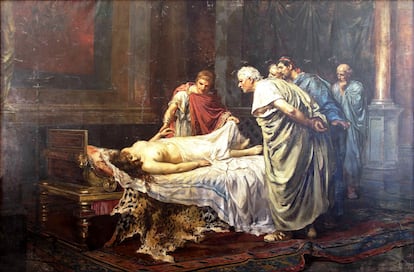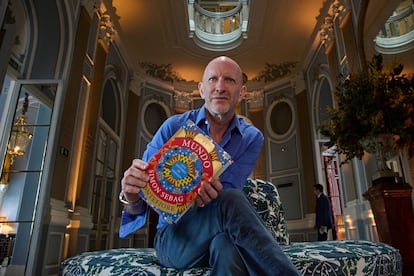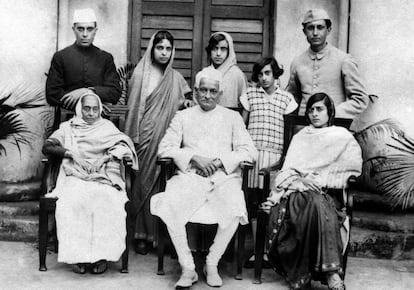From the incest of the Ptolemies to the infidelities of the Kennedys: British author Simon Sebag Montefiore’s lurid family history of humanity
Sex, executions, assassinations and gossip populate the 1,500-plus pages of the historian’s ambitious book


The World: A Family History of Humanity has so many exciting and salacious anecdotes that it’s hard to choose a favorite. Simon Sebag Montefiore’s 2022 book is an ambitious world history as told through the lives of family dynasties like the Ramessids, Habsburgs, Manchus, Romanovs, Bourbons, Hashemites, Rothschilds and Vanderbilts. The book focuses on “the dark side of history,” as the author says. The family histories take readers on a titillating 4,000-year journey of names, places and dates liberally populated with women. Take Ptolemy II Philadelphus (“sibling-lover”), who, true to his name, married his older sister. One of his lovers was Belistique, a female Olympic champion in chariot racing.
Montefiore’s book tells the story of historian Sima Qian who was forced by Emperor Wu to choose between suicide or castration. Sima decided to become a eunuch to finish his work — long live history! Emasculation during the Han dynasty required removing all of the male genitals and was performed in the silkworm chamber because the sterile environment helped avoid infections.
Another story is that of Abu Bakr, a chieftain of the Matuna Berber clan in northern Africa, who had the misfortune of being killed by an arrow shot by a Soninke warrior… who was blind. Or the tale of the young women selected to pleasure the lascivious Napoleon III, who were obliged to wait for him naked in the palace and told they could kiss His Majesty anywhere but his face. His final extra-marital affair was with a circus acrobat. Isma’il Pasha, the Khedive (viceroy) of Egypt, gave Napoleon III’s wife Eugenie a gold chamber pot with an emerald in the center inscribed with the supposedly gallant words, “Always Watching You.”
There’s also Alfred Krupp, a German steel manufacturer and arms supplier nicknamed “the cannon king,” who was obsessed with enemas. And Baron Louis de Rothschild, who is probably the only Jew who, when some Nazi SS troops came knocking, instructed the butler to tell them to return after lunch. Or John Fitzgerald Kennedy, who visited Madame Claude’s elegant Parisian brothel and requested a girl “like Jackie, but horny.”
Montefiore’s epic and unusual world history traverses the ages from the ancient Akkadian Empire in Mesopotamia to the Trumps and the Russian invasion of Ukraine. Prurient chapter titles include Group Sex and Human Sacrifice; Who Gets You Hard: Cleopatra, Caesar and Antony; and Mimi and Isabella: Your Little Archangel’s Ass, a chapter about Isabella of Parma and her Habsburg sister-in-law, Maria Christina, Duchess of Teschen. Montefiore’s book features a cast of extraordinary diversity, including the Achaemenid, Julio-Claudian, Ming, Valois, Medici, Braganza, Rockefeller, Assad, Nehru and Obama dynasties and families. Some unexpected guests and their relatives appear, such as Comanche war leader Quanah Parker, Shaka Zulu (who killed his mother), Lobengula, the last king of the Matabele, and T. E. Lawrence (of Arabia).
Its lively pages are full of intrigue, fratricide, torture and abundant sex — even a precocious Mozart with his little cousin. The historian takes us into the bedroom of Spain’s Catholic Monarchs. “Last night, in the service of God, we consummated the marriage,” Ferdinand VII of Spain announces. Piety did not prevent them from launching the body of a Moorish prisoner from a catapult. The author also takes us into the dark hearts of Columbus and his conquerors, who turned the tropical colonies into a sexual playground for the Spaniards. You can imagine what he writes of the Borgias. Even Charlemagne is accused of incest with his seven daughters, infamous for their adventures, groppings and sexual fantasies. Now that’s the stuff that sells history books, not dry accounts of Gothic kings.

Strangulations, beheadings, poisonings and castrations abound in the book. Why is there so much violence in the book? “Violence is an intensifier and accelerator of history, and it’s everywhere,” Montefiore said in our interview. “But my book, the product of a lifetime of reading, is also full of poetry, artists, historians, and kind things. But I admit to wanting to grab the reader’s attention, and the lurid episodes are exciting. Leading people through a universal history is challenging — anyone can write a boring story.” Montefiore likes the “marmalade dropper” expression used in The Economist’s positive book review — each page has something so surprising that readers drop their toast and jam. For example, servants of the caliph of Bagdad Al-Hadi (Harun’s older brother) bring a tray covered with a silk cloth. When the caliph uncovers the tray, he finds the severed heads of two beautiful young women “whose perfume still filled the air.” They were from his harem and had been discovered making love to each other. Al-Hadi didn’t even flinch.
By focusing on families, the author gained an innovative historical perspective which helped him sift through all the data. “To paraphrase Samuel Johnson, every kingdom is a family and every family a little kingdom,” said Montefiore. “One of the questions raised in the book is why family dynasties persisted throughout history to this day. The answer is that continuity, stability and security are all political objectives. Every system has costs. The cost of democracy is continuous change, while hereditary autocracies can plan for the longer term.”

Considering the new, modern families — is the book a swan song for traditional families (if the Ptolemies can be regarded as conventional)? “I thought that the nuclear family was doomed to disappear in the West. In Africa and Asia, it has never been threatened. But we saw how the pandemic meant a return to the family of old. Technology is also reuniting people with their homes and family life. The fact is, the family remains the fundamental unit of human existence.”
Montefiore admits to including a lot of sex in his book. “Well, sex and family go hand in hand.” Not so much for JFK. The historian laughs: “That’s true.” He writes about the former president’s unrestrained priapism, which led to sexual episodes like sharing Marilyn Monroe with his brother Bobby, and numerous mistresses like White House intern Mimi Alford, whom he once ordered to fellate his friend Dave Powers in the White House swimming pool. Montefiore mentions Suetonius, the Roman historian with an eye for scandal and gossip who knew how to make his subject entertaining and wrote a lost work called Lives of Famous Whores.

While Montefiore claims to have little interest in conforming to traditional historiography, his book is well-documented, even the passages that may seem like gossip. Alexander losing his virginity to Barsine “at a late age for a Macedonian,” Tutankhamun’s irascibility and Tiberius’s pet iguana are all rigorously researched and substantiated, often with original documents. “I didn’t use researchers — I tracked down all the material myself. Then I had my material reviewed by expert historians whom I trust very much.” These historians include well-known experts like Egyptologist Salima Ikram, Viking specialist Neil Price and Silk Road scholar Peter Frankopan. Even Henry Kissinger reviewed the book sections about the events of his time.
Montefiore says he is most interested in the personal side of world history and critiques the Marxist influence that led to history books focusing on macro issues and downplaying the importance of individuals. His book uses individuals and families — private lives — to tell the whole story in an intimate way. The author says it makes history more accessible but also shows its continuity. History is too often presented as an impersonal succession of battles, wars and falling empires. For example, talking about Hitler’s father as a Habsburg official illustrates where Hitler came from.

Montefiore’s favorite eras and families include the Caesars of ancient Rome. The book recounts Messalina’s infidelities and Nero’s incest with his mother, Agrippina, whom he later killed. “I also like the Renaissance period — I loved writing about many of those families. Some of them, like the Habsburgs, are essential to any history of that period. I have written before about the Romanovs and the Herods. But there are also lesser-known characters like the Sansons, who were a family of French executioners. One died when he slipped on blood during a guillotine decapitation. But my favorite may surprise people — the Arab prophet Muhammad’s family. I would like to have lived during the Umayyad dynasty in Damascus or the Abbasid caliphate in Baghdad. Those were periods of great cultural flourishing and literary talent, and as a Jew, I could have lived freely in those [Muslim] courts.”
To paraphrase Tolstoy, there do not seem to be many happy families. Philosopher Han Fei warned his emperor as far back as the second century BC that calamity will come from those you love. Montefiore said, “I write about powerful families, and power is a great destroyer of family relationships. The Ptolemies, Ottomans and Mongols excelled at that — it wasn’t easy to be a part of those families. Killing close relatives was indispensable to seizing and holding on to power. The competition had to be eliminated — the grave or the throne. Most importantly, the system worked.”
What comes next after publishing a book like this? “Go on a book tour, even if it means speaking to empty seats. Anything is better than the three years of hell to write the book.” There is one question left to ask. Would he have chosen castration like Sima Qian? “Absolutely, but although it almost killed me to write it, I can confirm that I finished my story intact.”
Sign up for our weekly newsletter to get more English-language news coverage from EL PAÍS USA Edition
Tu suscripción se está usando en otro dispositivo
¿Quieres añadir otro usuario a tu suscripción?
Si continúas leyendo en este dispositivo, no se podrá leer en el otro.
FlechaTu suscripción se está usando en otro dispositivo y solo puedes acceder a EL PAÍS desde un dispositivo a la vez.
Si quieres compartir tu cuenta, cambia tu suscripción a la modalidad Premium, así podrás añadir otro usuario. Cada uno accederá con su propia cuenta de email, lo que os permitirá personalizar vuestra experiencia en EL PAÍS.
¿Tienes una suscripción de empresa? Accede aquí para contratar más cuentas.
En el caso de no saber quién está usando tu cuenta, te recomendamos cambiar tu contraseña aquí.
Si decides continuar compartiendo tu cuenta, este mensaje se mostrará en tu dispositivo y en el de la otra persona que está usando tu cuenta de forma indefinida, afectando a tu experiencia de lectura. Puedes consultar aquí los términos y condiciones de la suscripción digital.








































